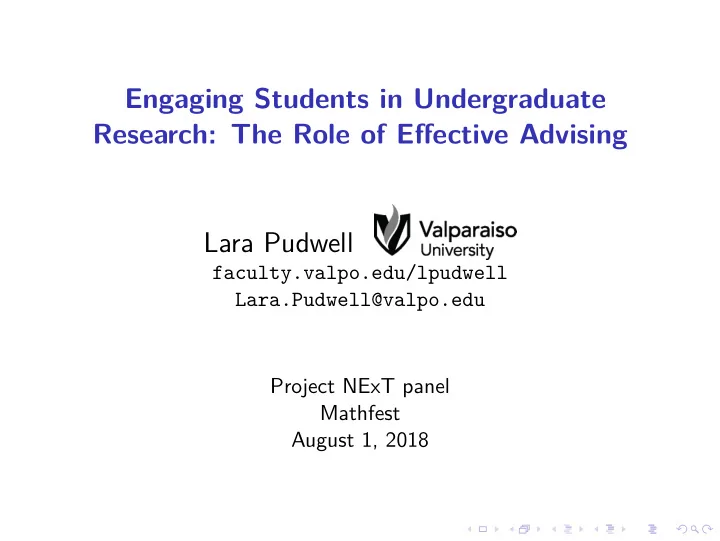

Engaging Students in Undergraduate Research: The Role of Effective Advising Lara Pudwell faculty.valpo.edu/lpudwell Lara.Pudwell@valpo.edu Project NExT panel Mathfest August 1, 2018
My experience ◮ 37 students over 10 years ◮ 6 academic year projects (teams of 3-5) ◮ 2 summer projects with local students ◮ 6 REU projects (teams of 3 external students) ◮ REU site director since 2011 (3 NSF grants)
Characteristics of Good Problems ◮ limited amount of prerequisite background ◮ students can study examples and use computers ◮ multiple layers of varying difficulty ◮ the faculty mentor has some idea how to solve the problem
Characteristics of Good Problems ◮ limited amount of prerequisite background ◮ students can study examples and use computers ◮ multiple layers of varying difficulty ◮ the faculty mentor has some idea how to solve the problem Example: How many permutations avoiding the patterns α and β have k peaks ?
Characteristics of Good Problems ◮ limited amount of prerequisite background ◮ students can study examples and use computers ◮ multiple layers of varying difficulty ◮ the faculty mentor has some idea how to solve the problem Example: How many permutations avoiding the patterns α and β have k peaks ? Really at least 30 problems in 1!
Finding Problems ◮ Go to conference talks or read papers.
Finding Problems ◮ Go to conference talks or read papers. ◮ Take a topic you like and change a variable. Example: contains and but avoids .
Finding Problems ◮ Go to conference talks or read papers. ◮ Take a topic you like and change a variable. Example: contains , , and .
Finding Problems ◮ Go to conference talks or read papers. ◮ Take a topic you like and change a variable. ◮ Computer exploration. Example: contains , , and .
Research Meeting Strategy ◮ Everyone gets a turn at the board.
Research Meeting Strategy ◮ Everyone gets a turn at the board. ◮ Feedback.
Research Meeting Strategy ◮ Everyone gets a turn at the board. ◮ Feedback. ◮ Each student articulates their task for the next meeting.
Research Meeting Strategy ◮ Everyone gets a turn at the board. ◮ Feedback. ◮ Each student articulates their task for the next meeting. ◮ Dropbox.
Results ◮ Every team produces a talk and/or poster. on campus, MAA section meeting, JMM, International Conference on Permutation Patterns
Results ◮ Every team produces a talk and/or poster. on campus, MAA section meeting, JMM, International Conference on Permutation Patterns ◮ Every team writes a paper. internal report , Involve, ISRN Combinatorics, Journal of Integer Sequences, DMTCS, Electronic Journal of Combinatorics
Challenges
Challenges (never what you expect...)
Rewards ◮ Sharing a passion for mathematics ◮ Going beyond the curriculum ◮ Gaining a new perspective ◮ Getting (re)energized ◮ Keeping a research routine ◮ Building mentoring relationships
Rewards ◮ Sharing a passion for mathematics ◮ Going beyond the curriculum ◮ Gaining a new perspective ◮ Getting (re)energized ◮ Keeping a research routine ◮ Building mentoring relationships What makes a successful project? ( Not every project is publishable. )
Rewards ◮ Sharing a passion for mathematics ◮ Going beyond the curriculum ◮ Gaining a new perspective ◮ Getting (re)energized ◮ Keeping a research routine ◮ Building mentoring relationships What makes a successful project? ( Not every project is publishable. ) What did the student gain from their work?
More resources? Coming soon! (2019?) from MAA/AMS/CUR: A Mathematician’s Practical Guide to Mentoring Undergraduate Research by Michael Dorff, Allison Henrich, and Lara Pudwell ◮ Why undergraduate ◮ Communicating results research? ◮ Finding funding ◮ A beginner’s guide * ◮ Summer REU programs ◮ Choosing problems ◮ Assessment ◮ Choosing students and ◮ Future directions managing group dynamics
More resources? Coming soon! (2019?) from MAA/AMS/CUR: A Mathematician’s Practical Guide to Mentoring Undergraduate Research by Michael Dorff, Allison Henrich, and Lara Pudwell ◮ Why undergraduate ◮ Communicating results research? ◮ Finding funding ◮ A beginner’s guide * ◮ Summer REU programs ◮ Choosing problems ◮ Assessment ◮ Choosing students and ◮ Future directions managing group dynamics * Michael Dorff, Allison Henrich, and Lara Pudwell, Successfully Mentoring Undergraduates in Research: A How To Guide for Mathematicians, PRIMUS: Problems, Resources, and Issues in Mathematics Undergraduate Studies 27.3 (2017), 320–336.
Recommend
More recommend